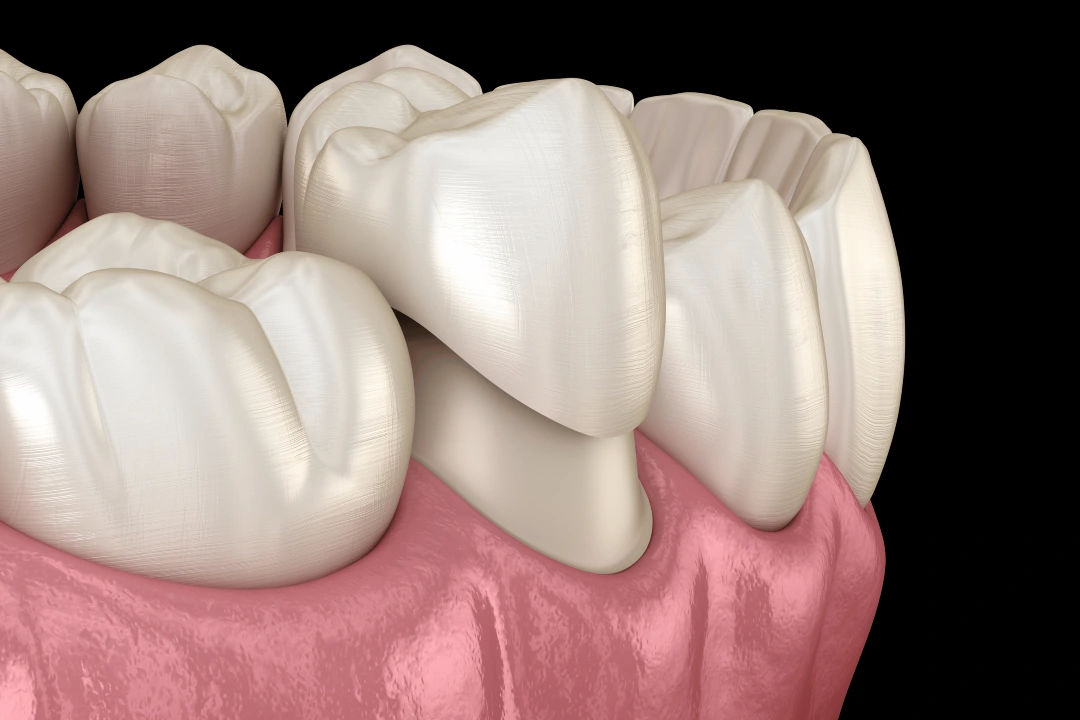Dental Crowns
Dental crowns, commonly referred to as caps, are custom-made dental restorations that cover and protect damaged or decayed teeth. They produce a seamless and attractive effect because they are made to closely resemble the natural size, shape, and colour of your existing teeth. Dental crowns are used to restore the functionality, strength, and appearance of a tooth that has been compromised due to decay, trauma, or other oral health issues.
At our dental hospital, we take pride in having a team of highly skilled and experienced dentists who specialize in dental crowns. Our dentists understand the importance of a healthy and beautiful smile, and they work closely with each patient to develop personalized treatment plans and deliver exceptional results.

When Are Dental Crowns Necessary?
Tooth Decay
Severe tooth decay can compromise the structural integrity of a tooth. Dental crowns provide a protective layer that prevents further decay and strengthens the tooth.
Fractured or Cracked Teeth
Teeth that are cracked, fractured, or weakened due to trauma or injury can benefit from the added support and protection offered by dental crowns.
Root Canal Treatment
After a root canal procedure, the treated tooth becomes more brittle. A dental crown provides the necessary reinforcement to prevent future fractures.
Cosmetic Improvements
Dental crowns can be used cosmetically to enhance the look of discoloured, irregularly shaped, or malformed teeth, resulting in a more attractive smile.
The Dental Crown Process
The process of getting a dental crown typically involves the following steps:
Consultation:
During your initial visit, our dentists will carefully examine your teeth and gums to determine if a dental crown is the appropriate treatment option for you. They will discuss your treatment goals, answer any questions you may have, and present you with a personalized treatment plan.
Tooth Preparation:
To ensure a proper fit, the dentist will carefully prepare the affected tooth by removing any decay or damage. If necessary, a dental filling or root canal treatment may be performed prior to crown placement.
Impression:
Once the tooth is prepared, our dentists will take a detailed impression of your teeth, which will be used by our dental laboratory technicians to create a custom-made crown that, in terms of size, colour, and form, precisely mimics your natural teeth.
Temporary Crown:
A temporary crown will be positioned to cover the prepared tooth while your permanent crown is being created. It is important to follow all the instructions provided by our dentists to ensure the temporary crown remains secure and functional until the final crown is ready.
Crown Placement:
Once your customized dental crown is ready, you will return to our dental hospital for the final placement. Our dentists will remove the temporary crown, carefully clean the prepared tooth, and check the fit, color, and appearance of the permanent crown. Once the fit is verified, the crown will be permanently cemented in place.
Benefits of Dental Crowns
The following stages are commonly involved in receiving a dental crown:
Restoring Function:
Dental crowns are created to bring back the strength and functionality of a broken tooth, enabling you to bite, chew, and talk without discomfort.
Enhancing Appearance:
Dental crowns are constructed specifically to match the shade, shape, and size of your natural teeth, giving you a radiant smile.
Long-lasting Results:
With proper care and maintenance, dental crowns can last for many years, providing durable and reliable tooth restoration.
Protecting Damaged Teeth:
Dental crowns act as a protective barrier, preventing further damage and decay to compromised teeth.
Improving Self-Confidence:
By restoring the appearance and functionality of your teeth, dental crowns can boost your self-esteem and improve your overall quality of life.
Selecting the Right Crown Material
Porcelain and Ceramic Crowns
These crowns offer exceptional aesthetics, mimicking the appearance of natural teeth. They are a popular choice for front teeth and visible areas.
Metal Crowns
Metal crowns, often made from alloys like gold or silver, are known for their durability and strength. They are typically used for molars and teeth that require significant reinforcement.
Porcelain-Fused-to-Metal (PFM) Crowns
PFM crowns combine the natural look of porcelain with the strength of metal, making them a versatile option for both front and back teeth.
Porcelain-Fused-to-Metal (PFM) Crowns
PFM crowns combine the natural look of porcelain with the strength of metal, making them a versatile option for both front and back teeth.
Caring for Your Dental Crown
Maintaining oral hygiene is crucial for the longevity of your dental crown. Follow these tips to ensure optimal care:
- Regular Brushing and Flossing: Brush your teeth twice a day and floss daily to prevent plaque buildup around the crown.
- Avoid Hard Foods: Be cautious when consuming hard foods or using your teeth to open packages to prevent damage to the crown.
- Routine Dental Visits: Schedule regular dental checkups to ensure the crown's integrity and address any potential issues
Dental crowns represent a remarkable advancement in modern dentistry, offering a solution that combines functionality with aesthetics. From repairing damaged teeth to enhancing your smile’s appearance, dental crowns play a pivotal role in oral health and self-confidence. If you’re considering dental crown treatment, consult a reputable dental hospital for expert guidance and personalized care.
